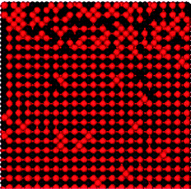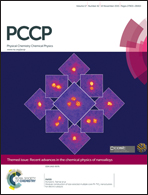Abstract
Free-surface-induced L10 chemical long-range ordering phenomena in a nanolayer, a nanowire and a cubic nanoparticle of FePt were studied by means of Monte Carlo simulations. The system was modeled with nearest-neighbor and next-nearest-neighbor interatomic pair interactions deduced from ab initio calculations. The generated samples, the dimensionality of which was determined by appropriate periodic boundary conditions imposed upon the generated supercells, were initially either perfectly ordered in the c-variant L10 superstructure ((001)-oriented monatomic planes), or completely disordered in the fcc crystalline structure. Vacancy-mediated creation of equilibrium atomic configurations was modelled by relaxing the systems at temperatures below the ‘order-disorder’ transition point using the Glauber algorithm implemented with the vacancy mechanism of atomic migration. The (100)-type-surface-induced heterogeneous nucleation of L10-order domains was observed and quantified by means of an original parameterization enabling selective determination of volume fractions of particular L10-variants. Due to the specific competition between the three kinds of (100)-type free surfaces, the initial c-L10 variant long-range order appeared to be the most stable in the cubic nanoparticle. The initially disordered samples were transformed by the creation of a specific L10 domain structure with a mosaic of particular L10-variant domains at the surfaces and almost homogeneous long-range order in the inner volume. The analysis of correlation effects revealed that chemical ordering was initiated at the free surfaces.

- This article is part of the themed collection: Recent advances in the chemical physics of nanoalloys

 Please wait while we load your content...
Please wait while we load your content...